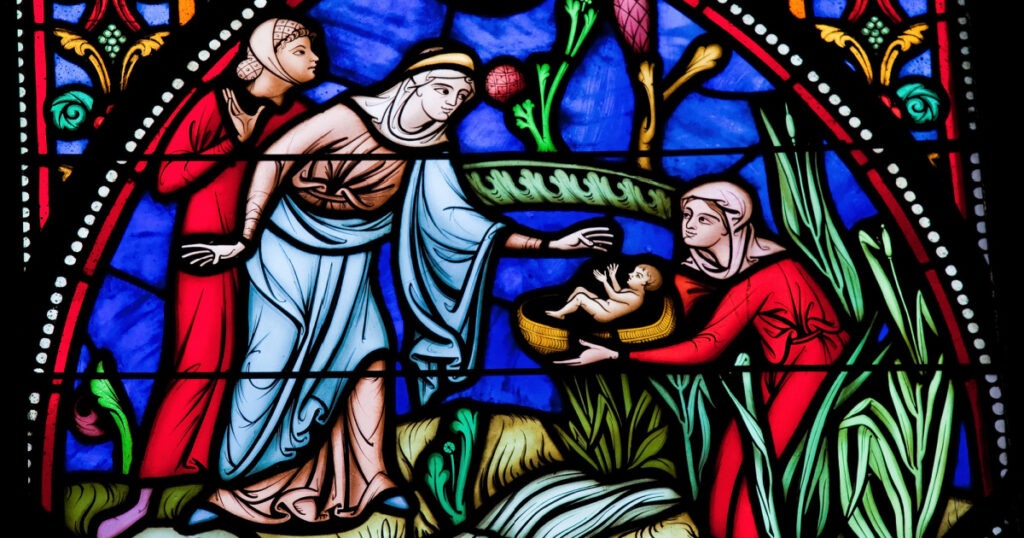If you’re curious about biblical childbirth, and by that I mean answering the question “what does the Bible say about childbirth?”, you’ve come to the right place. In this post we will explore what both the New Testament and Old Testament say about childbirth.
It’s not uncommon to see Christians take the word “biblical” and attach it to the beginning of other words to create standards of living that support their views on life. Biblical womanhood. Biblical marriage. Biblical worldview. And I’ll throw into the pot, biblical childbirth. Admittedly, the idea of biblical anything sounds good, but what does biblical childbirth actually mean?
For this our purposes, biblical childbirth will mean quite literally, what the Bible says about childbirth. We’re going to keep things simple. Let’s get started!

Pain in Childbirth
Is Pain in Childbirth a Curse from God?
One of the first places childbirth is mentioned in the Bible is in Genesis 3:1-24. This is the point where Adam and Eve chose to disobey God, sin entered the world, and the original couple experienced the pain and suffering of their choices. This is also the point at which the curses were doled out.
A common misconception, however, is the idea that pain in childbirth is a curse from God. Turns out that pain in childbirth is NOT a curse from God, and that the snake and ground were actually the recipients of the curses. Also, the original language speaks to the emotional pain in raising children and being in a family, not the actual moment of childbirth. To read more about how pain in childbirth is not a curse from God, head on over here.
Pain in Childbirth as a Metaphor
The majority of the references to birth pain in the Bible are used as a metaphor for scenarios involving men, ironically, in their fear and sufferings, typically resulting from their sin.
“When the kings joined forces, when they advanced together, they saw her and were astounded; they fled in terror. Trembling seized them there, pain like that of a woman in labor.” Psalm 48:4-6
“I hear a cry as of a woman in labor, a groan as of one bearing her first child” Jeremiah 4:31
“Anguish has gripped us, pain like that of a woman in labor.” Jeremiah 6:24
“Will not pain grip you like that of a woman in labor?” Jeremiah 13:21
“Ask and see: Can a man bear children? Then why do I see every strong man with his hands on his stomach like a woman in labor, every face turned deathly pale?” Jeremiah 30:6
“Kerioth will be captured and the strongholds taken. In that day the hearts of Moab’s warriors will be like the heart of a woman in labor.” Jeremiah 48:41 (the heart of a woman in labor here is describing someone in fear)
“Damascus has become feeble, she has turned to flee and panic has gripped her; anguish and pain have seized her, pain like that of a woman in labor.” Jeremiah 49:24
“Anguish has gripped him, pain like that of a woman in labor.” Jeremiah 50:43
“As a pregnant woman about to give birth writhes and cries out in her pain, so were we in your presence, Lord.” Isaiah 26:17
“The guilt of Ephraim is stored up, his sins are kept on record. Pains as of a woman in childbirth come to him, but he is a child without wisdom; when the time arrives,he doesn’t have the sense to come out of the womb.” Hosea 13:12-13
Childbirth pain is also used as a way to convey the suffering of creation as a whole caused by the effects of sin. Paul used it as a way to express his season of frustration with the early Christians in Galatia regarding their immature faith. Here are some New Testament verses on biblical childbirth.
“We know that the whole creation has been groaning as in the pains of childbirth right up to the present time.” Romans 8:22
“My dear children, for whom I am again in the pains of childbirth until Christ is formed in you, how I wish I could be with you now and change my tone, because I am perplexed about you!” Galatians 4:19-20
Honestly, I find these verses interesting because it sheds quite a bit of light on what men think (thought?) childbirth is like – filled with anguish, pain, groaning, and suffering. I personally don’t see childbirth in that light AT ALL. I see childbirth as a rite of passage, character building, life altering, empowering, and a sacred body, heart, and soul experience. But maybe that’s just me. 😉
Biblical Childbirth and Midwifery
Moving along, there are some really fun narratives regarding childbirth in the Bible. In Genesis 38 we learn of Tamar, a woman that was dealt a really, really bad hand. It’s a bizarre story, if you want to read it, but basically she became pregnant with twins by her deceased husband’s father after disguising herself as a prostitute. Totally normal, right? (I think this story is hard for our non-Jewish brains to understand. One thing I can take from it, however, is how courageous and patient Tamar was. She was a true woman of valor!)
“When the time came for her to give birth, there were twin boys in her womb. As she was giving birth, one of them put out his hand; so the midwife took a scarlet thread and tied it on his wrist and said, “This one came out first.” But when he drew back his hand, his brother came out, and she said, “So this is how you have broken out!” And he was named Perez. Then his brother, who had the scarlet thread on his wrist, came out. And he was named Zerah.” Genesis 38:27-30

Here are my take-aways.
- Her birth was attended by a midwife as midwifery care was the norm back then.
- She knew she was having twins ahead of time, which makes me think she had some sort of prenatal care with a midwife. I think it would be difficult for a first time mom to know she’s having twins without the expertise of someone like a midwife. I could be wrong here!
- Her son, Perez, was named after how the birth unfolded. Perez means to “break out”. LOL!
Midwives, Lies, and a Birth Stool
In this next narrative you’ll notice that again, the people of God are using midwives during their births.
“The king of Egypt said to the Hebrew midwives, whose names were Shiphrah and Puah, “When you are helping the Hebrew women during childbirth on the delivery stool, if you see that the baby is a boy, kill him; but if it is a girl, let her live.” The midwives, however, feared God and did not do what the king of Egypt had told them to do; they let the boys live. Then the king of Egypt summoned the midwives and asked them, “Why have you done this? Why have you let the boys live?” The midwives answered Pharaoh, “Hebrew women are not like Egyptian women; they are vigorous and give birth before the midwives arrive.” So God was kind to the midwives and the people increased and became even more numerous. And because the midwives feared God, he gave them families of their own.” Exodus 1:15-20
Notice how God blessed the midwives for being courageous and lying to the Pharaoh (!) in order to protect the most vulnerable citizens of Egypt – newborn babies. Also, did you notice the “delivery stool” so casually mentioned by the King of Egypt? I’m envisioning their world as a place where everyone having a baby had access to a birth stool, just like every hospital bed in the US has a squat bar.

Unassisted Homebirth
The most famous birth story of all time can be found in the gospel of Luke, where we read the story of how Mary gave birth to Jesus.
In those days Caesar Augustus issued a decree that a census should be taken of the entire Roman world. (This was the first census that took place while Quirinius was governor of Syria.) And everyone went to their own town to register.
So Joseph also went up from the town of Nazareth in Galilee to Judea, to Bethlehem the town of David, because he belonged to the house and line of David. He went there to register with Mary, who was pledged to be married to him and was expecting a child. While they were there, the time came for the baby to be born, and she gave birth to her firstborn, a son. She wrapped him in cloths and placed him in a manger, because there was no guest room available for them.” Luke 2:1-20
Mary and Joseph were out of town traveling when Mary went into labor. Not what they were planning, I’m sure, but that was the hand they were dealt. Mary was likely a young teenager, and away from her family, and perhaps even midwives, which means she likely gave birth with not a lot of help. I imagine Jesus’ moment of birth to be lowly, without any fanfare. The son of the God of the universe was born, but instead of a royal robe, he wore strips of cloth. To me, the birth story of Jesus reflects his character – gentle and lowly.
Take My yoke upon you and learn from Me, for I am gentle and lowly in heart, and you will find rest for your souls. For My yoke is easy and My burden is light.” Matthew 11:28-30

Biblical Childbirth Positioning
Next up is a verse from Job where God is speaking to Job, basically putting him in his place by reminding him that he (God) is all-knowing and has created all the things.
“Do you know when the mountain goats give birth? Do you watch when the doe bears her fawn? Do you count the months till they bear? Do you know the time they give birth? They crouch down and bring forth their young; their labor pains are ended. Their young thrive and grow strong in the wilds; they leave and do not return.” Job 39:1-4
The childbirth educator in me enjoyed the part where God explained how animals “crouch down and bring forth their young”. My interpretation? God thinks it’s normal for us animals to “crouch down” and not “lie down” to give birth. A friendly reminder to get off your backs!
Let it Go!
This is a good one…
“I’ve been quiet long enough. I’ve held back, biting my tongue. But now I’m letting loose, letting go, like a woman who’s having a baby.” Isaiah 42:14 (MSG)
Yes! Let it loose! Let it go!
From a previous blog post on coping through transition, “My final piece of advice for coping through the transition phase of labor is to just let go. Channel your inner Elsa and just LET IT GO. As a doula observing births and as a mom experiencing labor, I have found that once we decide to stop fighting labor, but embrace and work with it, our bodies relax and things progress.”
Maternal Mortality in the Bible
Unfortunately, death has always been a part of childbirth. Thankfully, our maternal mortality rate is much lower compared to biblical times, however it’s unfortunately still an issue, especially here in the United States. Did you know that black women are three times more likely to die from a pregnancy-related cause than white women? A topic for another day, but something we all need to be aware of and working on.
“Then they moved on from Bethel. While they were still some distance from Ephrath, Rachel began to give birth and had great difficulty. And as she was having great difficulty in childbirth, the midwife said to her, “Don’t despair, for you have another son.” As she breathed her last—for she was dying—she named her son Ben-Oni.” Genesis 35:16-18
“His daughter-in-law, the wife of Phinehas, was pregnant and near the time of delivery. When she heard the news that the ark of God had been captured and that her father-in-law and her husband were dead, she went into labor and gave birth, but was overcome by her labor pains. As she was dying, the women attending her said, “Don’t despair; you have given birth to a son.” But she did not respond or pay any attention. She named the boy Ichabod, saying, “The Glory has departed from Israel”—because of the capture of the ark of God and the deaths of her father-in-law and her husband. She said, “The Glory has departed from Israel, for the ark of God has been captured.” 1 Samuel 4:19-22
What I noticed…
- While the women were dying, their midwives told them to not despair because they gave birth to sons.
- The women were able to name their babies before they died.
- Rachel had a hard, abnormal birth. “Rachel began to give birth and had difficulty and suffered severely.” AMP
- Sounds like Philehas’s wife had an abnormal birth too. “She went into abnormal labor, bent over, and gave birth.” CJB
I will always wonder what exactly happened during these births that led to death. I wish there were more details!
Birth Amnesia
So there’s this phenomena that happens with women after birth where they sort of “forget” the acute pain they experienced during childbirth. No, birth amnesia doesn’t happen with everyone, but it’s fueled by endorphins, an adorable baby, and even more hormones. Sometimes I’l go back and read one of my birth stories, and I’m a little taken aback by how intense it was for me. I forgot! But believe me, as soon as those contractions hit you with baby #2, you remember and often say something like “I’m never doing this again”. LOL!
“A woman giving birth to a child has pain because her time has come; but when her baby is born she forgets the anguish because of her joy that a child is born into the world. So with you: Now is your time of grief, but I will see you again and you will rejoice, and no one will take away your joy.” John 16:21-22
Verses I Don’t Know What To Do With
Honestly, I don’t really have much to say here about this and I don’t know what to do with it. So, here you go.
Postpartum Levitical Purification Laws
“The Lord said to Moses, “Say to the Israelites: ‘A woman who becomes pregnant and gives birth to a son will be ceremonially unclean for seven days, just as she is unclean during her monthly period. On the eighth day the boy is to be circumcised. Then the woman must wait thirty-three days to be purified from her bleeding. She must not touch anything sacred or go to the sanctuary until the days of her purification are over. If she gives birth to a daughter, for two weeks the woman will be unclean, as during her period. Then she must wait sixty-six days to be purified from her bleeding. “‘When the days of her purification for a son or daughter are over, she is to bring to the priest at the entrance to the tent of meeting a year-old lamb for a burnt offering and a young pigeon or a dove for a sin offering. He shall offer them before the Lord to make atonement for her, and then she will be ceremonially clean from her flow of blood. “‘These are the regulations for the woman who gives birth to a boy or a girl. But if she cannot afford a lamb, she is to bring two doves or two young pigeons, one for a burnt offering and the other for a sin offering. In this way the priest will make atonement for her, and she will be clean.’” Leviticus 12:1-8

Here’s another verse I don’t really know what to do with.
“But women will be saved through childbearing—if they continue in faith, love and holiness with propriety.” 1 Timothy 2:15 (Here’s what Rachel Held Evans had to say about it. She couldn’t figure it out either.)
Biblical Postpartum Care
I almost want to group these next few verses with the previous “I don’t know what to do with these” verses, as they’re pretty out there too, but I did draw one interesting nugget from the narrative. First, go ahead and read the following metaphorical shenanigans.
A Woman and the Dragon
“A great sign appeared in heaven: a woman clothed with the sun, with the moon under her feet and a crown of twelve stars on her head. She was pregnant and cried out in pain as she was about to give birth. Then another sign appeared in heaven: an enormous red dragon with seven heads and ten horns and seven crowns on its heads. Its tail swept a third of the stars out of the sky and flung them to the earth. The dragon stood in front of the woman who was about to give birth, so that it might devour her child the moment he was born. She gave birth to a son, a male child, who “will rule all the nations with an iron scepter.” And her child was snatched up to God and to his throne. The woman fled into the wilderness to a place prepared for her by God, where she might be taken care of for 1,260 days.” Revelation 12:1-6
All theological commentaries aside, let’s focus on how long God made sure this woman was cared for during her postpartum recovery. 1,260 days. That’s a total of 3 years and 5 months. Wouldn’t the world be a better place if women were cared for, in a special place, for one thousand two hundred and sixty days after they gave birth?
And all the mamas said, AMEN.
What is Biblical Childbirth?
Did you learn anything about biblical childbirth? Was it what you thought it would be? It was certainly interesting for me to gather all these verses in one place, and take a look at them as a whole.
Just know, if someone says they’re planning a biblical childbirth, watch out, because what they’re really planning for is a loud, wild, messy birth attended by women (or no-one!), with a birthing stool, or crouched down low, with a naming ceremony immediately after the birth, and a very, very long postpartum recovery period.
